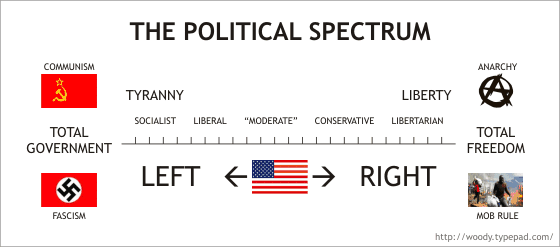I’m not sure that the left and the right can be defined simply in terms of whether they are in favour of big government or opposed to it. It could be argued that there are actually four possibilities: big-government societies of the left, small-government societies of the left, big-government societies of the right and small-government societies of the right.
Societies of the left are theoretically equalitarian: according to their doctrine, the ideal state of affairs is one in which everyone is on the same level, with nobody in a position of privilege over anyone else. Societies of the right are theoretically elitist: according to their doctrine, the ideal state of affairs is one in which everyone occupies a place within a vertically stratified society that corresponds to their personal degree of merit (or lack thereof) or luck (or lack thereof). Big-government societies tend to be what exist in the real world, particularly in large nation-states. Small-government societies tend to exist mostly on paper, in the writings of political and economic theorists; where they exist in the real world, it tends to be only in social entities that are much smaller than nation-states.
A small-government and genuinely equalitarian society of the left would be a “commune” in the true sense of the word (as opposed to what the USSR was, namely a big-government society of the left). A small-government society of the right would correctly be described as a libertarian one, not necessarily as a conservative one. Libertarians and conservatives (using those terms for purposes of convenience; there may be better ones available) may both be fine with the concept of a vertically-stratified society, but they differ on the role that government should play in society. In the libertarian view, government should not interfere with individuals; ideally, in fact, there should be little or no government at all. Conservatives, by contrast, are open to the existence of bigger governments that the libertarian view permits; in this respect, conservative views overlap to some extent with those of the centre and the left. Where these views differ is on the subject of what government should be used for – an example being the tendency of the left to be seen as pro-labour (and of actively working in support of that agenda when it’s in power) and of the right to be seen as pro-business (and of actively working in support of that agenda when it’s in power). A libertarian would probably argue that government shouldn’t be pro-anything – certainly not pro-labour, but not even pro-business.









